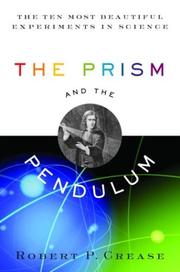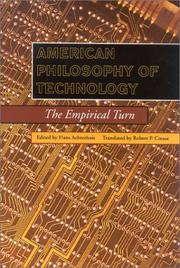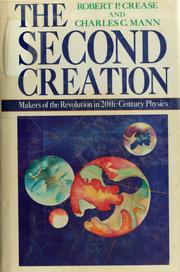| Listing 1 - 6 of 6 |
Sort by
|

ISBN: 1400061318 Year: 2003 Publisher: New York (N.Y.): Random House
Abstract | Keywords | Export | Availability | Bookmark
 Loading...
Loading...Choose an application
- Reference Manager
- EndNote
- RefWorks (Direct export to RefWorks)
Science --- -Science --- -53.08 --- Natural science --- Science of science --- Sciences --- History --- Experiments --- General principles and theory of measurement and the design of measuring apparatus. Measurement methods --- Experiments. --- History. --- 53.08 General principles and theory of measurement and the design of measuring apparatus. Measurement methods --- 53.08
Book
Year: 1997 Publisher: Dordrecht Kluwer
Abstract | Keywords | Export | Availability | Bookmark
 Loading...
Loading...Choose an application
- Reference Manager
- EndNote
- RefWorks (Direct export to RefWorks)

ISBN: 0253214491 0253339030 9780253214492 Year: 2001 Publisher: Bloomington Indiana university press
Abstract | Keywords | Export | Availability | Bookmark
 Loading...
Loading...Choose an application
- Reference Manager
- EndNote
- RefWorks (Direct export to RefWorks)
Introduces contemporary American philosophy of technology through six of its leading figures. The six American philosophers of technology whose work is profiled in this clear and concise introduction to the field―Albert Borgmann, Hubert Dreyfus, Andrew Feenberg, Donna Haraway, Don Ihde, and Langdon Winner―represent a new, empirical direction in the philosophical study of technology that has developed mainly in North America. In place of the grand philosophical schemes of the classical generation of European philosophers of technology (including Martin Heidgger, Jacques Ellul, and Hans Jonas), the contemporary American generation addresses concrete technological practices and the co-evolution of technology and society in modern culture. Six Dutch philosophers associated with Twente University survey and critique the full scope and development of their American colleagues’ work, often illustrating shifts from earlier to more recent interests. Individual chapters focus on Borgmann’s engagement with technology and everyday life; Dreyfus’s work on the limits of artificial intelligence; Feenberg’s perspectives on the cultural and social possibilities opened by technologies; Haraway’s conception of the cyborg and its attendant blurring of boundaries; Ihde’s explorations of the place of technology in the lifeworld; and Winner’s fascination with the moral and political implications of modern technologies. American Philosophy of Technology offers an insightful and readable introduction to this new and distinctly American philosophical turn.
Technology --- Philosophy, American --- Technologie --- Philosophie américaine --- Philosophy. --- Philosophie --- -Applied science --- Arts, Useful --- Science, Applied --- Useful arts --- Science --- Industrial arts --- Material culture --- Philosophy --- -Philosophy --- Philosophie américaine --- Technology and civilization --- Technology - Philosophy.

ISBN: 0025214403 9780025214408 Year: 1986 Publisher: New York (N.Y.) Macmillan
Abstract | Keywords | Export | Availability | Bookmark
 Loading...
Loading...Choose an application
- Reference Manager
- EndNote
- RefWorks (Direct export to RefWorks)
Physics --- Grand unified theories (Nuclear physics) --- History --- 53 <09> --- Natural philosophy --- Philosophy, Natural --- Physical sciences --- Dynamics --- Grand unification theories (Nuclear physics) --- GUT (Nuclear physics) --- Unification of fundamental particle interactions (Nuclear physics) --- Unified theories --- Gauge fields (Physics) --- Nuclear reactions --- Supergravity --- Supersymmetry --- Unified field theories --- 53 <09> Physics--Geschiedenis van ... --- Physics--Geschiedenis van ... --- Physics - History --- Grand unified theories (Nuclear physics) - History
Book
ISBN: 0674967461 0674735935 9780674735934 9780674417090 0674417097 Year: 2015 Publisher: Cambridge, Massachusetts Harvard University Press
Abstract | Keywords | Export | Availability | Bookmark
 Loading...
Loading...Choose an application
- Reference Manager
- EndNote
- RefWorks (Direct export to RefWorks)
In a career that included tenures as president of Stony Brook University, director of Brookhaven National Laboratory, and science advisor to President George W. Bush, John Marburger (1941–2011) found himself on the front line of battles that pulled science ever deeper into the political arena. From nuclear power to global warming and stem cell research, science controversies, he discovered, are never just about science. Science Policy Up Close presents Marburger’s reflections on the challenges science administrators face in the twenty-first century. In each phase of public service Marburger came into contact with a new dimension of science policy. The Shoreham Commission exposed him to the problem of handling a volatile public controversy over nuclear power. The Superconducting Super Collider episode gave him insights into the collision between government requirements and scientists’ expectations and feelings of entitlement. The Directorship of Brookhaven taught him how to talk to the public about the risks of conducting high-energy physics and about large government research facilities. As Presidential Science Advisor he had to represent both the scientific community to the administration and the administration to the scientific community at a time when each side was highly suspicious of the other. What Marburger understood before most others was this: until the final quarter of the twentieth century, science had been largely protected from public scrutiny and government supervision. Today that is no longer true. Scientists and science policy makers can learn from Marburger what they must do now to improve their grip on their own work.
Science and state --- Science --- Science consultants --- Physicists --- Science advisors --- Consultants --- Natural science --- Natural sciences --- Science of science --- Sciences --- Political aspects --- Marburger, John H., --- Marburger, John H.
Book
ISBN: 0271033223 Year: 2005 Publisher: University Park, Pennsylvania : The Pennsylvania State University Press,
Abstract | Keywords | Export | Availability | Bookmark
 Loading...
Loading...Choose an application
- Reference Manager
- EndNote
- RefWorks (Direct export to RefWorks)
Our modern society is flooded with all sorts of devices: TV sets, automobiles, microwaves, mobile phones. How are all these things affecting us? How can their role in our lives be understood? What Things Do answers these questions by focusing on how technologies mediate our actions and our perceptions of the world. Peter-Paul Verbeek develops this innovative approach by first distinguishing it from the classical philosophy of technology formulated by Jaspers and Heidegger, who were concerned that technology would alienate us from ourselves and the world around us. Against this gloomy and overly abstract view, Verbeek draws on and extends the work of more recent philosophers of technology like Don Ihde, Bruno Latour, and Albert Borgmann to present a much more empirically rich and nuanced picture of how material artifacts shape our existence and experiences. In the final part of the book Verbeek shows how his “postphenomenological” approach applies to the technological practice of industrial designers. Its systematic and historical review of the philosophy of technology makes What Things Do suitable for use as an introductory text, while its innovative approach will make it appealing to readers in many fields, including philosophy, sociology, engineering, and industrial design.
| Listing 1 - 6 of 6 |
Sort by
|

 Search
Search Feedback
Feedback About UniCat
About UniCat  Help
Help News
News